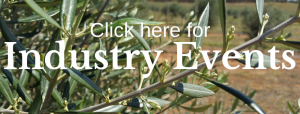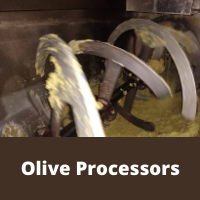The international olive industry is one step closer to implementing regulations that will support fair exports and consumers’ interest following a hot topic session coordinated by the Australian Olive Association at the American Oil Chemists’ Society (AOCS) Annual Meeting held in Seattle, USA, on 20 May.
Paul Miller, President of the Australian Olive Association (AOA), was invited by the AOCS, the major international organisation for food oil chemistry, to present a session on ‘Regional approaches to extra virgin olive oil quality’, which included nine speakers from Europe, Argentina, the USA, Canada and Australia.
Paul Miller said Australia, which is currently the largest consumer of olive oil per capita outside the Mediterranean, is seen as a technical leader of new olive oil producers due to its modern technical and scientific approach to agriculture.
“Our olive oil industry is involved directly in issues of regulation and quality definition whereas, in the EU countries, there is a disconnection between the producers, the scientists and regulators,” Miller said.
“Our integrated approach helps us find ways to better authenticate olive oil and describe its quality and to overcome problems with dysfunctional European standards,” he added.
Australia’s production of extra virgin olive oil represents two to three per cent of the world’s extra virgin production and at least five per cent of the world’s high quality extra virgin olive oil. Australian production is also expected to rise from 14 million litres in 2008 to 27 million litres by 2014.
Miller said one of the issues discussed at the international meeting was the difficulty many countries, including Australia, have with existing EU standards and the Codex Alimentarius Standard.
“These standards have been used to restrict trade as they apply restrictive levels on some minor components of olive oils that many oils don’t meet,” Miller said.
“At the same time, the standards do not adequately detect the blending of refined olive oil with extra virgin olive oil. Because of this, consumers are disadvantaged when they buy imported extra virgin olive oil believing it to be the best when, in fact, there may be quite a bit of second grade oil in the bottle.
“The Seattle meeting put the matter of true olive oil quality from new producing countries firmly on the global agenda and should help protect trade of Australian olive oils into the USA and Canada and, in the longer term, in other countries,” he added.
The value of Australian extra virgin olive oil exports rose from $1.2 million in 2002 to $12.3 million in 2007, with a positive outlook for the future partly due to the increase in production.
Miller explained that the USA (with California being a growing producer of olive oil) announced during the session proposals to establish standards that will for the first time see detailed quality requirements for olive oil in the USA backed by newly created laboratories and tasting panels.
“Australia supports this move and has had input into the standards to ensure that they accommodate our natural variations in olive oil chemistry while at the same time including testing that will be a good basis for the detection of fraud,” Miller said.
According to Miller, the Seattle session is not only a major step forward in enabling fair trade of Australian extra virgin olive oil into foreign markets, but also a progression towards best serving consumers’ interest.
“The AOA supports better ways to define freshness and quality because that is what our consumers want. Their needs will be much better served as new methods are used to define the best olive oil. Thanks to this meeting, the concept of consumer preferences – freshness, taste and quality of the oil – is now firmly on the scientific agenda,” he added.
Miller said the Australian Olive Association, which received financial support from the Rural Industries Research and Development Corporation (RIRDC) to facilitate this international meeting, will soon commence surveillance of olive oils in the Australian market under the new Australian Code of Practice for the olive industry. The AOCS session provided excellent guidance on the direction this surveillance will take.
Topics discussed included new analytical possibilities to survey quality and identify olive oils, olive oil chemistry in various countries, surveillance and analysis of olive oil and more. Australian renowned olive industry specialists Dr Rod Mailer and Leandro Ravetti were speakers at the event.
The Australian Olive Association has received positive feedback from the session which was attended by approximately 60 scientists, regulators and leading industry people from around the world.
The AOCS has already approached the Association to discuss the possibility of taking the issue of olive oil quality further at the next meeting in May 2009 in Orlando, Florida.
Australian extra virgin olive oil is the natural oil from quality olives that have been picked straight off the tree and extracted as soon as possible without the use of chemicals or excessive heat. This is to ensure that the oil’s remarkable health benefits, flavour and freshness are maximised.
The Australian Olive Association was founded in 1995 as the industry body to encourage research and dissemination of information and the sustained development of a national olive industry in Australia.
More information on the Australian Olive Association is available at http://www.australianolives.com.au or by calling (02) 9863 8735.


